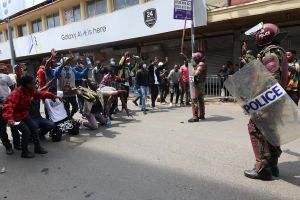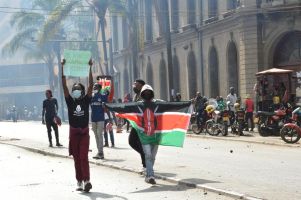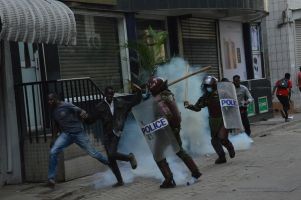Throughout Kenya, violent demonstrations broke out on Tuesday, leading to at least two fatalities, as anti-government protests continued for the third consecutive week.
Despite President William Ruto retracting the proposed tax policies on June 26, which initially triggered the protests, the turmoil persisted.
Tuesday’s demonstrations were marked by road blockades, looted stores, burned vehicles, gunfights, flaming tires, and robberies.
Businesses in Nairobi, the nation’s capital, closed down, transportation halted, and residents avoided the central business district (CBD), where numerous young individuals clashed with law enforcement in ongoing conflicts.
While I thought everything would be peaceful apart from sporadic clashes with the police, today violence and theft were rampant as observed by one the young protesters known by the name Humphrey who had taken part in previous demonstrations.
 He emphasized that criminals have seized control of the protests to steal, plunder, and damage property. Protestors had taken to the streets to demand changes from the government, including the removal of corrupt officials.
He emphasized that criminals have seized control of the protests to steal, plunder, and damage property. Protestors had taken to the streets to demand changes from the government, including the removal of corrupt officials.
Demonstrators also insisted on government apologies and compensation for the families of those who died during the confrontations with the police and security forces.
Immaculate, another young protestor, expressed disheartenment by the violence and theft, stating she had planned to participate in peaceful demonstrations. “We must now prioritize protecting ourselves from these criminals. We cannot continue with the protests,” she asserted.
As law enforcement clashed with demonstrators chanting Anti-Government slogans while grappling to apprehend looters targeting establishments, mayhem erupted inside the CBD. Skirmishes erupted among hooligans, protesters, and business proprietors defending their stores.
Protesters obstructed the majority of roads leading in and out of Nairobi with stones and flaming tires.
The Mombasa-Nairobi Highway, a vital transportation route for goods from the port of Mombasa to the inland and neighboring nations, got obstructed at Mlolongo, approximately 20 km from Nairobi’s CBD, causing commuters and drivers to be stuck.
Similar scenarios played out on Thika Road and Waiyaki Way, as protesters barricaded the roads and clashed with law enforcers employing tear gas in an attempt to scatter them.
Demonstrators plundered establishments, including social venues, in Kitengela, a suburb south of Nairobi, as they surpassed the number of law enforcement officers.
The Directorate of Criminal Investigations stated that their investigative teams had been sent out to pursue gang members captured by vigilant citizens violently robbing innocent Kenyans on the streets during the ongoing protests and warned those engaged in criminal acts that the long arm of the law would catch up with them.
President William Ruto’s decision to retract the tax proposals detailed in the Finance Bill 2024, which sought to generate an extra 346.7 billion shillings (approximately 2.7 billion U.S. dollars) to support the 31 billion dollar budget for the 2024/2025 fiscal year, did not manage to suppress public turmoil.

Despite his appeal for discussions, the protests have descended into violence, heightening political tensions and disrupting regular business operations in the largest economy of East Africa.
“After the bill was approved, the nation saw demonstrations and damage to key institutions. Attentively listening to the voice of the Kenyan people, who have vehemently expressed their rejection of the Finance Bill 2024, I acknowledge and hence I will not endorse it and it will subsequently be withdrawn,” stated Ruto.
The Kenya National Commission on Human Rights (KNCHR) declared on Monday that a minimum of 39 individuals perished during nationwide demonstrations, a figure that climbed to 41 by
Tuesday, along with 361 others sustaining injuries. “The commission emphasizes that what began as peaceful protests have transformed into chaos, leading to numerous fatalities and damage to property,” stated KNCHR Chairperson Roseline Odede.
Protests also took place in various cities such as Kisii and Kisumu in western Kenya, Mombasa on the coastline, and Eldoret in the Rift Valley.
Numerous global leaders have advocated for caution to avert further aggravation of the political turmoil.
Volker Turk, United Nations Human Rights Commissioner, expressed sorrow regarding the protests and appealed for “restraint to enable the exercise of the rights to peaceful assembly and freedom of speech, as well as discussions to heed the voices of young individuals.”
Moussa Faki Mahamat, Chairperson of the African Union Commission, implored national stakeholders to participate in productive dialogues and tackle the contentious matters.

